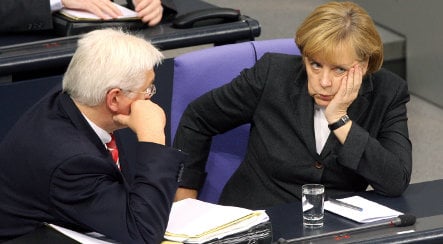Europe’s economic powerhouse has been ruled by a coalition of Chancellor Angela Merkel’s CDU/CSU conservatives and the centre-left Social Democrats (SPD) since inconclusive elections three years ago.
Despite being uneasy partners, observers have been pleasantly surprised by the relative harmony displayed by this “grand coalition” when the financial crisis began, with ministers closing ranks and apparently speaking as one.
But the rival parties do not want stay joined at the hip for another four long years and the shadow of elections next September is looming ever larger on the political horizon.
Nowhere is the attempt by the SPD and the CDU/CSU to differentiate themselves in the eyes of voters more evident than in the push in the past week by the SPD’s chancellor candidate Frank-Walter Steinmeier.
The silver-haired Steinmeier, 52, who is also vice chancellor and foreign minister, is fronting a demoralised and divided party with miserable poll ratings and faces an uphill task to beat the popular Merkel.
Ex-chancellor Gerhard Schroeder’s former chief of staff has never run for elected office, and many wonder if he has the killer instincts, ability to deliver snappy soundbites and popular appeal needed to knock 54-year-old Merkel off her perch.
His task is made all the more difficult by the fact that in Germany there is a political tradition dictating that a foreign minister must be loyal to a chancellor, even if they are from different parties.
But moves by Steinmeier in the past week suggest that he may keep trying to break with tradition to score political points – in the middle of the worst global financial crisis since the 1930s and with Germany in recession.
The first sign came last Thursday when Steinmeier, under growing pressure from within his own party to be more visible, raised eyebrows by coming up with an ambitious set of recipes aimed at helping Europe out of the economic slump.
The proposals appeared to contradict some of what has been coming out of Berlin in recent weeks, with calls for substantial pan-European stimulus measures and even for “more dialogue” with the European Central Bank.
And he neglected to mention to Merkel that he was going to make these proposals, who has been adamant that her government’s own measures are sufficient to get Germany through the slowdown.
The second incident, on Monday, was equally surprising and also served to make it look like Berlin’s response to the economic crisis was not as coordinated as Merkel’s fellow leaders at last weekend’s G20 summit might hope.
Merkel was due to receive top executives from Opel pleading for government loan guarantees of around €1billion ($1.3 billion) in case US parent company General Motors goes bankrupt.
But Steinmeier had also arranged a meeting with workers representatives from all of Germany’s car industry later on Monday evening – again, without Merkel’s knowledge – since these were “the people with a direct view of what the effects of the crisis are,” the Social Democrat’s spokesman said.
“Mr. Steinmeier will continue … in future to meet social-political figures whom he thinks are relevant where and when he likes,” his spokesman Jens Ploetner said.
The main government spokesman Ulrich Wilhelm put a brave face on matters — after an text message exchange between Steinmeier and Merkel, according to the Süddeutsche Zeitung daily – saying Steinmeier’s tete-a-tete with the unions was “not in competition” with Merkel’s powwow with the executives.
But it was clear to observers that the election campaign has begun.
“I think this is more to do with him being chancellor candidate, definitely. He has to make sure that in this whole financial crisis … he doesn’t stay completely invisible as chancellor candidate,” Oskar Niedermayer from Berlin’s Free University said. “He has to play different roles, that sometimes even calls for opposing activities, and that is not easy,” Niedermayer told AFP. “For the German political system this is not normal.”
“This is a bitter taste of what’s to come next year, in election year,” the Financial Times Deutschland bemoaned in an editorial.


 Please whitelist us to continue reading.
Please whitelist us to continue reading.